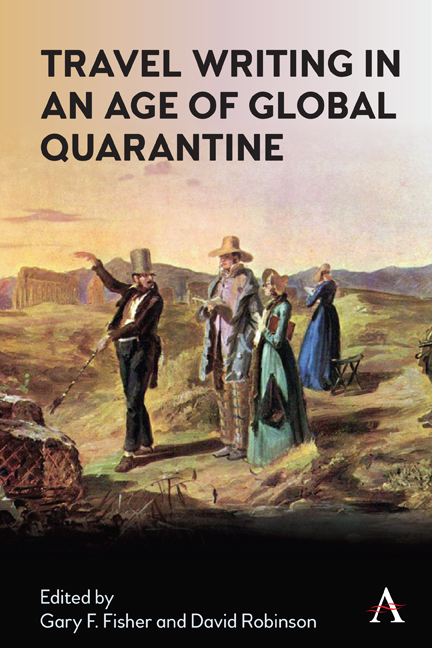Book contents
- Frontmatter
- Contents
- Foreword
- Acknowledgements
- Introduction
- Chapter One ‘Off-Stage, A War’: Wuhan, 1938
- Chapter Two Frederic Lees in Varese Ligure, 1911
- Chapter Three ‘A Rude People Subjected to No Restraint’: In Tanimbar with Anna Keith Forbes, Henry Forbes and So’u Melatunan
- Chapter Four Sent to Coventry: A Journey Home?
- Chapter Five Bedouin Is a Place: Freya Stark’s Travel with Nomads
- Chapter Six With Wilkie in the West: Reading Wilkie Collins’s Rambles beyond Railways from a Cornish Perspective
- Chapter Seven Picturing Rome: Walking the Eternal City with the Last Victorian
- Chapter Eight Su e zo per i ponti; or, How History Does Not Help
- Chapter Nine A Town Called Entropy: Boom and Bust in Arnold Bennett’s Potteries
- Chapter Ten Travelling towards Transculturalism? Statues, Remembrance and Mourning in Bloemfontein, South Africa
- Chapter Eleven Recollections of the King’s House
- Chapter Twelve Occupying Her Time: Ginette Eboué, France, 1940–42
- Epilogue
- List of Contributors
- Works Cited
Chapter Nine - A Town Called Entropy: Boom and Bust in Arnold Bennett’s Potteries
Published online by Cambridge University Press: 18 November 2021
- Frontmatter
- Contents
- Foreword
- Acknowledgements
- Introduction
- Chapter One ‘Off-Stage, A War’: Wuhan, 1938
- Chapter Two Frederic Lees in Varese Ligure, 1911
- Chapter Three ‘A Rude People Subjected to No Restraint’: In Tanimbar with Anna Keith Forbes, Henry Forbes and So’u Melatunan
- Chapter Four Sent to Coventry: A Journey Home?
- Chapter Five Bedouin Is a Place: Freya Stark’s Travel with Nomads
- Chapter Six With Wilkie in the West: Reading Wilkie Collins’s Rambles beyond Railways from a Cornish Perspective
- Chapter Seven Picturing Rome: Walking the Eternal City with the Last Victorian
- Chapter Eight Su e zo per i ponti; or, How History Does Not Help
- Chapter Nine A Town Called Entropy: Boom and Bust in Arnold Bennett’s Potteries
- Chapter Ten Travelling towards Transculturalism? Statues, Remembrance and Mourning in Bloemfontein, South Africa
- Chapter Eleven Recollections of the King’s House
- Chapter Twelve Occupying Her Time: Ginette Eboué, France, 1940–42
- Epilogue
- List of Contributors
- Works Cited
Summary
In the first days of January 2020 I decided to make a literary pilgrimage within the English Midlands. Given that this region has produced some of the most revered writers in English literature, I was somewhat spoilt for choice in terms of destination. Stratfordupon-Avon, the picture-perfect birthplace of William Shakespeare, stands out as the obvious choice for the bookish tourist. The city of Birmingham, erstwhile stomping ground and inspiration of a young J. R. R. Tolkien, compounds cosmopolitan cuisine with a profound literary heritage to make for another attractive destination. Perhaps even the rugged, industrial landscape of the Erewash Valley, backdrop to so many of D. H. Lawrence's rebellious and panoptic castigations of modernity, might serve to attract the literary pilgrim. Yet I chose a different, and altogether overlooked, destination. I went to the loose confederation of towns that comprise the Potteries, or Stoke-on-Trent as they are described on a map today. I went on the trail of an author who once ruled the literary world, but has long since departed from the popular imagination. I went in search of Arnold Bennett.
You may be forgiven if that name means little to you. It means little to most. Yet, during the early twentieth century, Arnold Bennett was perhaps the most frequently read, prodigious and recognisable authors in the English-speaking world. At the age of 21, Bennett left behind his humble origins and moved from the provincial Midlands to the bright lights of London in order to pursue a career as a writer. In 1898 he published his first novel, A Man from the North, which took inspiration from his experiences of moving southwards. By the end of the First World War, he had continued publishing novels at the rate of one per year, penned eight plays, worked as a wartime propagandist for His Majesty King George V, served as the editor of a popular women's magazine, and all the while maintained a lively career as a journalist publishing across numerous newspapers and periodicals. Bennett's literary success thrust him into a world of international acclaim. Writing in 1925, fellow Midlander J. B. Priestley described Bennett as ‘one of the most successful men of letters of his time’.
- Type
- Chapter
- Information
- Travel Writing in an Age of Global Quarantine , pp. 119 - 134Publisher: Anthem PressPrint publication year: 2021



